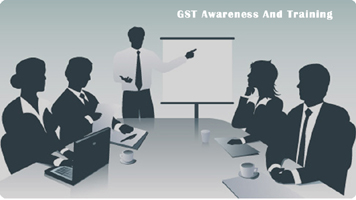
Bhide Consultants organizes GST workshops. Workshop covers Overview of GST and Model GST Law (CGST & SGST), Levy of and Exemption from Tax, Registration ,Record Keeping; Tax Invoice; Invoice Rules, Meaning and Scope of Supply, Valuation in GST, Payment of GST, Job Work, Input Tax Credit, Input Service Distributors, Refunds, Demands; Audits; Appeals; and Revision, Transition provisions, Overview of the IGST Act, Place of Supply of Goods & Services, GST Portal. Click here to see our trainig Programs.

These trainings are useful for Accounting Professionals & Practitioners, Business Owners To understand the impact of GST on their respective businesses, Employees of Finance & Accounts To have better compliance, Students of Finance & Commerce To understand GST for further studies and research.
As per the GST Council, entities in special category states with an annual turnover of Rs.10 lakhs and above would be required to register under GST. All other entities in rest of India would be required to register for GST if annual turnover exceeds Rs.20 lakhs. There are also various other criteria's, that could make an entity liable for obtaining GST registration - irrespective of annual sales turnover. Entities required to register for GST as per regulations must file for GST application within 30 days from the date on which the entity became liable for registration under GST.

Documents Required :
With potential business partners able to check a fellow taxpayer’s rating, having a low rating could result in being passed by for a new business opportunity, or dropped from an existing relationship. Businesses with a higher rating can expect for their needs to be prioritized in the GSTN ecosystem.

Selection of cases for audit or scrutiny will also be influenced by a taxpayer’s GST compliance rating. A high rating will likely indicate to the GST Council that things are in order — no need to take a closer look. Adversely, a lower rating could very well indicate compliance problems that warrant an audit, something that will require extra resources from the taxpayer under scrutiny.
GST envisages three types of Audit. The first audit is by a chartered accountant or a cost accountant. Every registered person whose aggregate turnover during a financial year exceeds two crore rupees has to get his accounts audited by a chartered accountant or a cost accountant and furnish a copy of audited annual accounts and a reconciliation statement, duly certified, in FORM GSTR-9C. In the second type which is the normal audit, the Commissioner or any officer authorised by him, can undertake audit of any registered person for such period, at such frequency and in such manner as may be prescribed. The third type of audit is called the Special Audit.

In Special Audit the registered person can be directed to get his records including books of account examined and audited by a chartered accountant or a cost accountant during any stage of scrutiny, inquiry, investigation or any other proceedings;depending upon the complexity of the case.
To download GST Audit PDF Click Here
Supervisory Control covers a wide variety of disciplines in GST. These are all well integrated in our work process as well as in the deliverables. This process is designed to provide supervisors clarity in their roles that will enhance organization's ability to be in control GST System. To operationalise the anti-profiteering clause, the GST council has formulated the anti-profiteering rules (APR).

These prescribe a three-stage anti-profiteering administrative structure and a three-stage mechanism to deal with consumer complaints about profiteering practices by the businesses in the wake of GST implementation.3 The administrative structure comprises a nine-member standing committee of the GST council, Director General of Safeguards (DGS), and a five-member National Anti-Profiteering Authority (NAPA).
Support Services of GST means services provided in relation to GST and includes accounting and processing of transactions, Identify and resolve mismatches in inward and outward supplies, Follow-up for the correction of mismatches within the agreed timeline, Working and issuing debit notes/credit notes, Report on the status of mismatches received,resolved and pending along with their reasons, Reconcile input tax credit availed and available vis-a-vis GST returns for all locations, Reconcile other ledgers of ERP,

Prepare accounting entries to be passed in the books of accounts of the respective locations, Sending out account statements to A, B & C categories of suppliers and customers as per their business requirements. GST Support services may fall in additional services attached to main services so it may cost you.